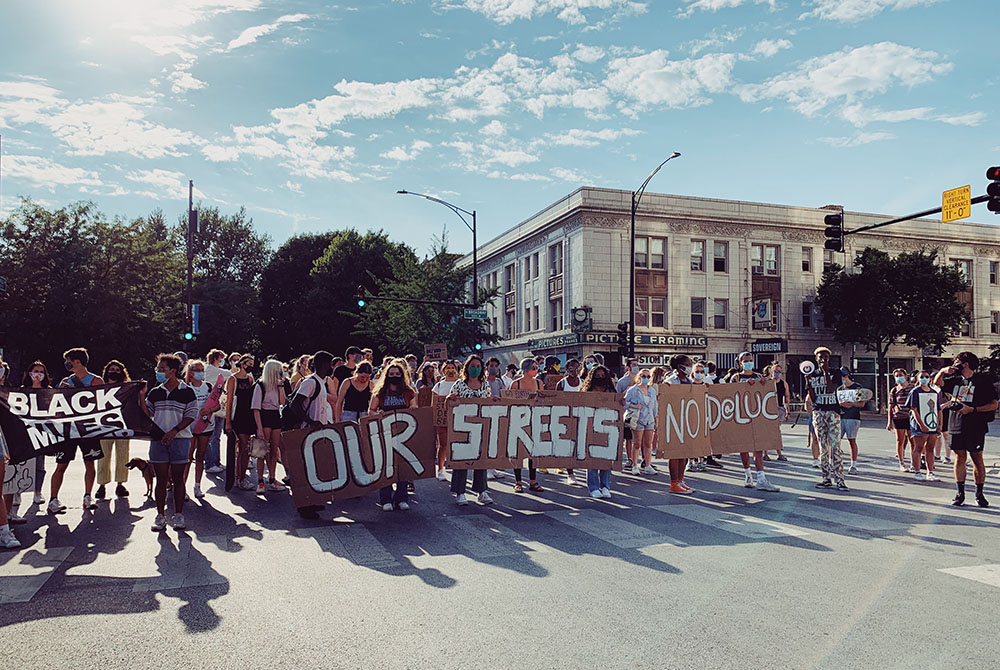
Our Streets LUC demonstrates outside the campus of Loyola University Chicago on Aug. 22. The group has been fighting for the school to cut ties with the Chicago Police Department, among other reforms. (Courtesy of Our Streets LUC)
During the summer of 2020, millions of people across the country joined protests against racism and police violence, leading The New York Times to suggest in June that Black Lives Matter was perhaps the largest social movement in U.S. history.
At Catholic colleges across the U.S., students, faculty and staff have also called for their institutions to confront racism, by cutting ties with local police departments and reforming or divesting from their campus security forces.
At Loyola University Chicago, students in the Our Streets LUC movement have been fighting for the school to cut ties with the Chicago Police Department and implement a list of reforms recommended by the university's Black Cultural Center, among other demands.
At Villanova University in Pennsylvania, students, faculty and staff banded together to form the Villanova Antiracist Alliance, which calls for campus police to set aside weapons and police cars while patrolling campus.
And at Duquesne University in Pittsburgh, the mother of a student who died in the presence of campus safety officers has staged a hunger strike, forgoing solid food since July to demand campus police reform and transparency.
"A lot of Black students have experienced being racially profiled on campus and being unjustifiably stopped by campus safety officers — 'Are you a student here, take out your ID.' "
At each institution, organizers argued that for many Black students, faculty and staff, as well as other people of color, campus policing does not always equate to safety. Black students, they said, often experience harassment and suspicion from their own campus cops.
"A lot of Black students have experienced being racially profiled on campus and being unjustifiably stopped by campus safety officers — 'Are you a student here, take out your ID,' " said Elise Purnsley, co-president of Loyola Chicago's Black Cultural Center. "It doesn't matter if you're in a classroom studying, doesn't matter if you're walking to the library [or] if you're waiting for your friend to let you into their dorm."
Dorien Perry-Tillmon, an organizer with Our Streets LUC, said he doesn't even venture near campus anymore unless absolutely necessary after he was arrested by Chicago police — along with six other people — during a protest outside campus.
While he was being arrested, he said, he heard officers shouting his name, which made him feel targeted.
"Even when I'm walking to my friend's place or something, a police car will drive by, and I get an extra stare," he said. "It's like they know who I am."
Accusations of excessive force
Armed police on some Catholic campuses have also been accused of using excessive force against students, particularly students of color. At Loyola Chicago, two students of color sued the university in 2018 for excessive force and violation of civil rights after an interaction with campus police that was captured in a viral video, according to the Chicago Reader.
The two students were filming an interaction between campus police and two Black men who were accused of scalping tickets outside the university's basketball arena. An officer grabbed one student, Alan Campbell, who is Black, threw him to the ground and arrested him, the Reader reported, then turned and grabbed the other student, Paloma Fernandez — who is Latina — by the shirt collar and pushed her up against a wall.
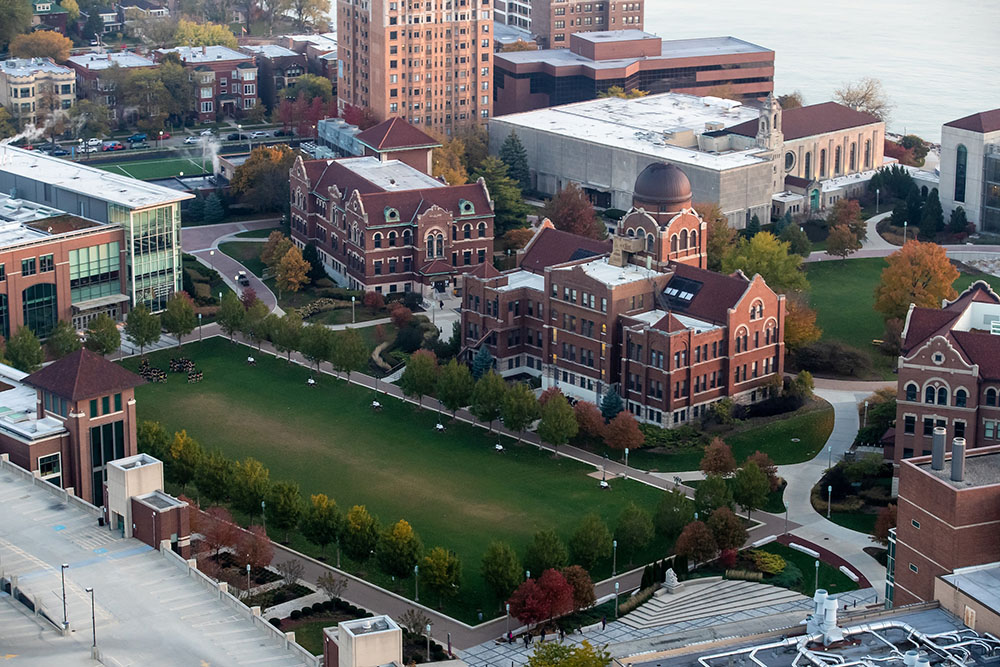
An aerial view of the Lake Shore campus of Loyola University Chicago is seen in 2019. Between 2016 and 2018, roughly 66% of the people stopped and frisked by Loyola police officers were Black in a neighborhood that is only about 27% Black, according to data compiled by the Illinois Department of Transportation. (CNS/Courtesy of Loyola University Chicago/Lukas Keapproth)
An investigation by Loyola Chicago found that its officers did not use excessive force, according to the Chicago Reader.
This incident sparked a movement known as #NotMyLoyola that called for campus police transparency, policy reviews and greater support for students of color on campus.
Disparities in campus policing can also spill out into local communities, especially when universities are located in working-class neighborhoods and communities of color, said Vincent Lloyd, director of the Africana Studies Program at Villanova.
Loyola's campus police, who are authorized to carry weapons and make arrests, disproportionately stopped and frisked Black people on campus and in the nearby neighborhood of Rogers Park. Around 66% of the people stopped and frisked by campus police between 2016 and 2018 were Black, in a neighborhood that is roughly 27% Black, according to data compiled by the Illinois Department of Transportation.
Loyola spokesperson Anna Shymanski Zach said in an email to NCR that the campus safety office strives to "promote and maintain a safe and secure environment" and to "attain the highest degree of ethical behavior and professional conduct at all times."
Armed with the power to arrest
All of the largest Catholic colleges and universities have some form of police or campus safety office. Some have officers who are armed and can arrest students, faculty, staff or community members.
NCR examined campus safety reports at the 40 largest Catholic institutions and, when data on campus safety powers was not available online, spoke to public safety and communications personnel at a few of the institutions.
Advertisement
Just under half of the 40 institutions had campus safety officers empowered to make arrests. Exactly half had armed officers.
Of the 10 largest institutions, eight had armed officers, and seven empowered those officers to make arrests. But campus safety officers at the two largest Catholic institutions in the U.S. — DePaul University in Chicago and St. John's University in New York, both Vincentian schools — are unarmed and do not have the power to make arrests independently of local or state police.
Two institutions, La Salle University in Philadelphia and Molloy College in Rockville Centre, New York, either declined to comment or did not respond when asked whether their campus safety officers are armed. Molloy representatives also declined to comment on whether their campus officers have the power to arrest students.
These statistics roughly align with previous research on private institutions by the Bureau of Justice Statistics, which showed that in 2011-12, about four in 10 private colleges and universities with more than 2,500 students had sworn officers (with full arrest powers) and slightly fewer had armed officers on campus. By contrast, more than nine out of 10 public institutions had sworn or armed officers.
Lloyd said faculty, staff and students see armed officers differently depending on their identities and the relationships between police and civilians in their communities back home. Many white, middle- and upper-class students may see armed officers as symbols of safety. But for others, campus police can be a source of anxiety.
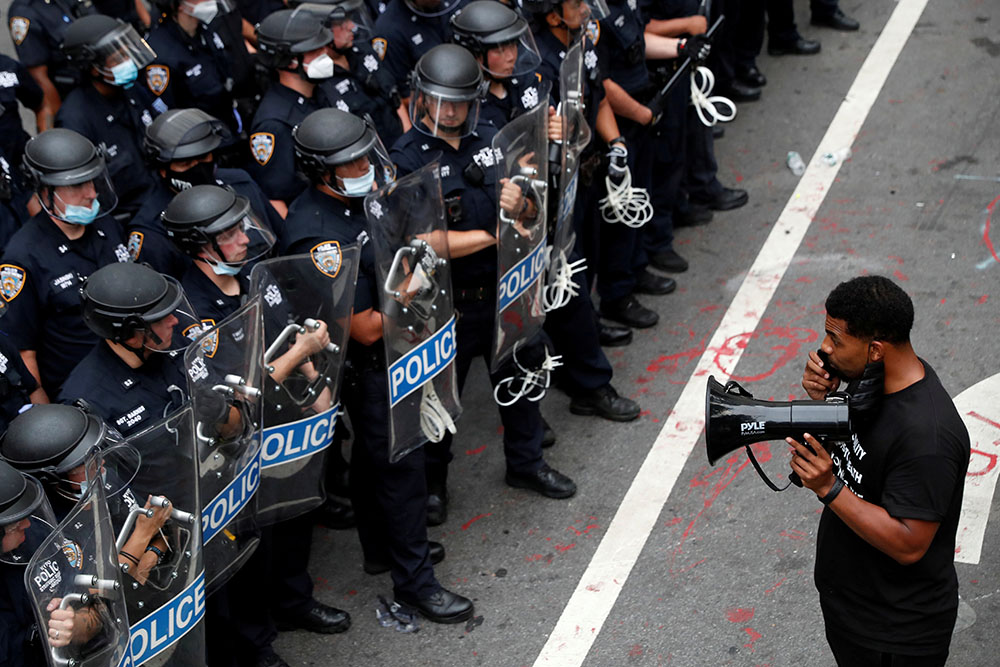
A demonstrator with Black Lives Matter stands in front of police officers in New York City inside of an area called the "City Hall Autonomous Zone" July 1. Vincent Lloyd, director of the Africana Studies program at Villanova, said being trained and empowered to use force against other people — as police are — can be damaging to the souls of officers. (CNS/Reuters/Andrew Kelly)
"Black students in particular share many stories about feeling targeted by campus police for doing everyday things, like hanging out with friends playing basketball and going around campus in the evening," Lloyd said. "I imagine that the feeling of being targeted is all the more intense when you're targeted by someone who not only has a uniform, but also has a gun."
Sometimes exchanges between armed campus police and students can turn deadly.
In 2013, a campus officer at the University of Incarnate Word, a Catholic institution in San Antonio, shot and killed a student named Cameron Redus. Campus police said they had pulled over Redus, who was unarmed, believing that he was driving under the influence, according to the Caller Times of Corpus Christi, Texas.
A grand jury did not indict the officer. Redus' family sued, and the university said the suit was invalid due to limits on lawsuits against government entities, the Caller Times reported.
"There seems to be little question that we are the government," the school's lawyer said, according to the Caller Times. "We are, after all, the police."
'From tainted origins'
Lloyd co-authored an article in The Bias Magazine, along with graduate student Nathaniel Grimes, where they traced the history of policing in the U.S. back to slave patrols in the South and anti-worker repression in the North. He argued that this class oppression and anti-Black racism is still embedded in policing today.
"From tainted origins, one won't get a ... pure or a good or helpful product or an institution that's responsive to the actual needs of people or the nation," Lloyd told NCR.
College campuses didn't always have their own dedicated police departments. The first one was established at Yale University in 1894, according to the Yale Daily News. But for a long time, Yale was an outlier.
In the 1960s and 1970s, many predominantly white colleges and universities started admitting students of color, according to an article by Robert T. Chase and Yalile Suriel of Stony Brook University. Around the same time, protests erupted at college campuses across the country to challenge racism and the Vietnam War, among other issues.
"College campuses must take a hard look at their own practices to ask how they contribute to racialized policing."
Chase and Suriel noted that sometimes local and state enforcement was called in to quell the protests — firing on and arresting Black protesters at Texas State University in 1967 and even killing two students in a women's dorm at the historically Black Jackson State University in 1970 during anti-war protests.
Many universities started their own police forces around this time under intense public pressure to control their campuses, Chase and Suriel wrote. But campus police have at times inflicted violence on civilians, Chase and Suriel wrote, as when University of Cincinnati police shot a local Black resident off campus in 2015.
"College campuses must take a hard look at their own practices to ask how they contribute to racialized policing," the two authors concluded.
William Horne, a postdoctoral fellow in the humanities at Villanova University and member of the Villanova Antiracist Alliance, said that in the past decade, policing on college campuses has intensified in part due to fears of violence sparked by incidents such as the 2012 shooting at Sandy Hook Elementary in Newtown, Connecticut, and the 2018 shooting at Marjory Stoneman Douglas High School in Parkland, Florida.
However, only 2% of annual gun fatalities are caused by mass shootings, according to The Trace, an outlet that focuses on gun violence in the United States. And Rutgers professor Matthew Mayer, who studies school violence, told The Trace in 2019 that there is no "rigorous causal evidence" that armed guards reduce violence or shootings in educational settings.
Horne said armed campus police can present a danger to students, particularly those from marginalized communities. Looking at police officers based in K-12 schools, HuffPost found at least 32 incidents of police pepper spraying students, and at least 15 cases of police body slamming, tackling or choking students between January 2016 and August 2018. The same study found at least 120 incidents of school police tasering students between 2011 and 2018.
Villanova added armed its police in 2016, despite student protests against the move and despite relatively low levels of violence in the suburban community surrounding campus, Lloyd said.
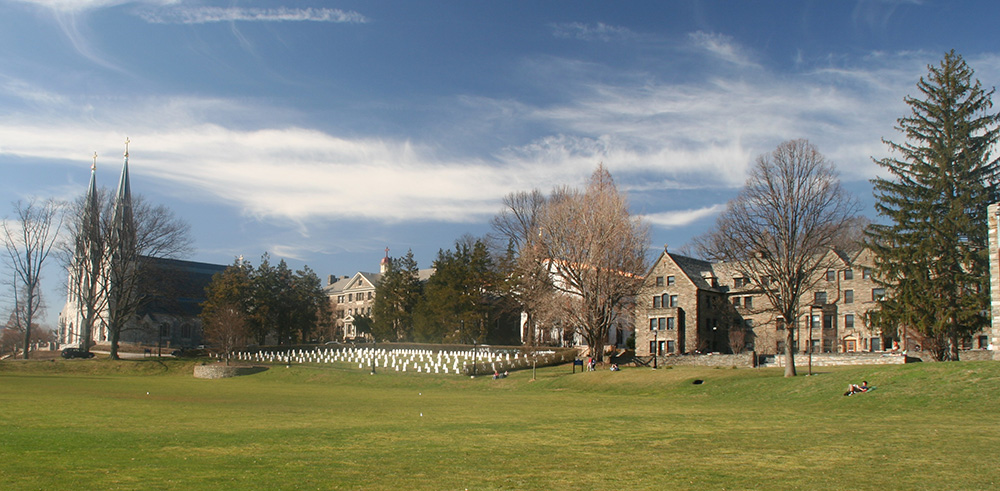
Villanova University's campus is seen in a 2010 photo. (Wikimedia Commons/Alertjean)
"We are extremely fortunate that Villanova has been a safe place," Augustinian Fr. Peter Donohue, Villanova president, said in a statement published on the university website, "but given the increased frequency of safety and security incidents at colleges nationwide, it is essential that the University is proactive in strengthening our ability to provide a safe and secure campus environment."
Options for campus safety
Activists and some faculty at Loyola, Villanova and other Catholic institutions have diverse visions of what safety on their campuses means.
Perry-Tillmon said he wants to be able to walk around campus without fear, something he said is not feasible for most Black students, especially Black women. Campus police haven't been helping, he added, especially for students of color and those with mental illness.
Purnsley and Connor Elmore, the co-presidents of Loyola's Black Cultural Center, said they would like to see campus police officers become more a part of the community and more accountable to students. The center has recommended that the school publish officers' conduct records and require officers to disclose their names and badge numbers when interacting with people on campus.
"If you're here with us, I should understand who you are, and you should have some understanding of who I am and what I'm going through," Elmore said.
In response to conversations with the Black Cultural Center and other student groups, the university announced it would be giving officers "integrity cards" to hand out to students and other civilians upon interacting with them, with interaction numbers for each encounter. The goal, the Department of Campus Safety said, is to make sure students know who the officer is so they can report any concerns about the experience.
At Villanova, more than 100 faculty, staff and students signed a petition calling for a variety of anti-racist initiatives and for the school's campus officers to "shed the garb of American policing."
"This means both changing the uniforms and accoutrements — especially weapons — of the department to reflect a civilian body, but also abandoning the police vehicles that set them apart from the community as outside agents of surveillance and enforcement," the petition said.
Horne said he thinks there are a range of options for campus safety at Villanova, any of which would be better than what it has now.
He said the school could scale back on its use of armed police, bringing them out only in extreme circumstances.
Most of what campus police actually do, he said, involves mundane tasks or jobs that don't really require an armed officer, such as checking on students who are having mental health crises, or who have overdosed or passed out from drinking too much alcohol.
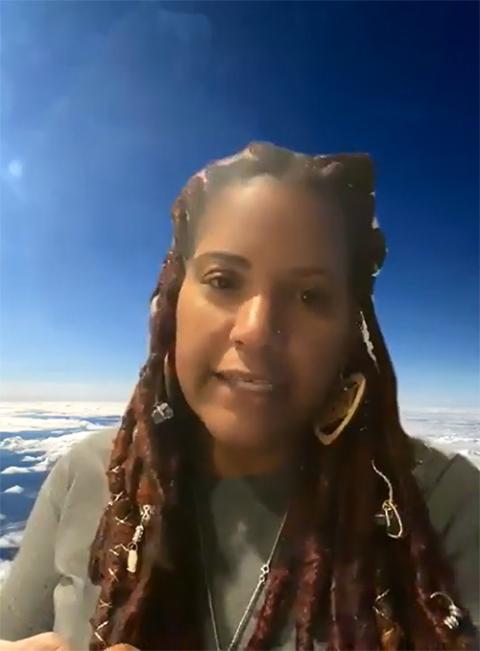
Dannielle Brown speaks during a Oct. 5 Facebook Live conversation hosted by the Abolitionist Law Center. (NCR Screenshot)
Dannielle Brown, whose son Marquis Jaylen "J.B." Brown died after falling from a 16th-story dorm room at Duquesne University, has been on a hunger strike since July to advocate for campus police reform and transparency. A Pittsburgh police report said her son had been acting "erratically" before he died in the presence of campus police officers.
Brown said in an Oct. 5 Facebook Live session hosted by the Abolitionist Law Center that she once worked in law enforcement and has a master's degree in counseling psychology. She said she finds it hard to believe the campus officers who were in the room when her son died "acted in the most prudent manner possible," as the school said in a Sept. 25 statement.
She said college campuses need to make sure police are not the first option when someone is having a mental health crisis. Mental health counselors and social workers would be a better resource, she said.
Since Brown began her hunger strike, the university purchased body cameras for its police officers, according to The Duquesne Duke. As of Dec. 4, Brown's hunger strike is ongoing.
Catholic values offer room for alternatives
Student organizers and faculty said they have seen some positive responses to their demands, both from administration and other students. Horne said the response from Villanova's student body has been largely positive, and Perry-Tillmon said a petition Our Streets LUC started has received more than 7,000 signatures.
Loyola's Black Cultural Center held a virtual town hall Oct. 8 to share students' experiences and discuss their recommendations. More than 100 people attended, according to the student newspaper.
Perry-Tillmon said, however, that he was frustrated with what he saw as the school's lack of concrete action. He called the administration's response to Our Streets LUC's demands "negative" and said the university's response was to "criminalize" and threaten protesters with disciplinary action.
"If instead of criminalizing myself and the other protesters, you looked into the reasons why we were protesting, and then fixed those issues, we wouldn't have to protest," he recalled telling an administrator in a meeting.
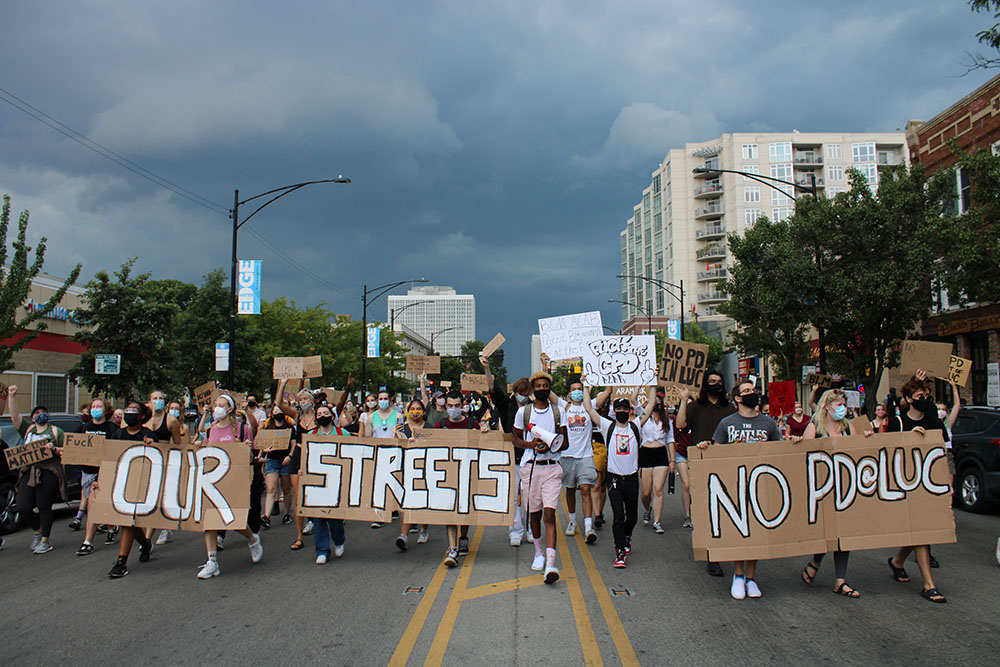
Our Streets LUC holds a protest outside the campus of Loyola University Chicago on Aug. 23. (Courtesy of Our Streets LUC)
In response to questions from NCR, Shymanski Zach, the spokesperson from Loyola Chicago, said in an email that the university established an anti-racism initiative in June 2020 (prior to the formation of Our Streets LUC in August). The initiative, according to an Oct. 20 statement on Loyola's website, has instituted mandatory racial bias training for freshmen, established an Institute for Racial Justice and expanded mental health resources for Black students, among other actions.
In regards to its ties with Chicago police, Shymanski Zach said the scholarship programs for Chicago police officers are part of the school's Jesuit mission to provide education and instill social justice values in all members of society.
She said the university has continued to meet with members of the Black Cultural Center and other student groups to look for ways to strengthen ties between campus safety and students.
In a statement on June 6, before the Villanova petition was released, that university's president affirmed the school's support for Black Lives Matter and pledged to "denounce racism, bigotry and violence in all its forms" and provide additional support for students of color on campus.
And on July 13, the university established a new task force on race to review curricula and assess the racial climate on campus.
The university's Faculty Congress released a statement — which has garnered more than 300 signatures — calling for Villanova administration to implement "institutional change to model a proactive move away from armed policing on campus and instead toward expanded mental health and community-building resources."
Lloyd said he believes college campuses could see the movement against racism and police violence as an opportunity. Catholic values, he said, offer room for alternatives to punishment and policing when people harm one another.
For instance, in The Bias Magazine article, Lloyd and Grimes wrote about the concept of formation, where people in a community share their knowledge with one another and grow together into more moral beings without a top-down punitive justice system, "in a community that collectively struggles against domination" and forms of oppression.
"Religiously affiliated campuses are particularly well-suited for our moment," Lloyd said. "Because they can be places where the kind of experimentation that we as a nation and culture need about alternatives to policing can happen."
[Madeleine Davison is an NCR Bertelsen intern. Her email address is mdavison@ncronline.org.]






